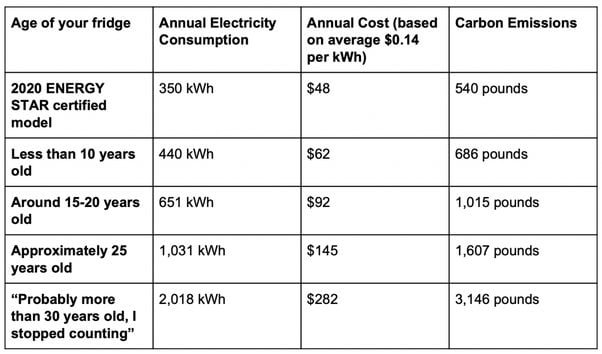When it comes to managing household expenses, understanding the energy consumption of your appliances is crucial. Among these, the refrigerator is often one of the most significant contributors to the monthly energy bill due to its constant operation. Today at TheKitchenApplianceDad.com, we’re diving deep into the details of how much electricity a refrigerator typically uses per month and what factors can influence this consumption.
The amount of electricity that a refrigerator uses per month can vary widely based on several factors including its size, age, model, and energy efficiency. On average, a typical household refrigerator can consume anywhere from 100 to 400 kilowatt-hours (kWh) per month. To put it into perspective, the Energy Information Administration (EIA) estimates that the average refrigerator uses about 57 kWh per month.
In recent years, advancements in technology have led to the development of more energy-efficient refrigerators. Models with ENERGY STAR ratings often use 9-25% less energy than models that meet the federal minimum energy efficiency standard. You can check if a fridge is ENERGY STAR certified by looking for the logo on the appliance or checking on the ENERGY STAR website.
Several variables impact how much electricity a refrigerator uses. Understanding these can help you manage your energy costs more effectively.
The size of the refrigerator significantly affects its energy consumption. Larger models have bigger spaces to cool, which typically requires more energy. Additionally, the type of refrigerator (e.g., side-by-side, top freezer, bottom freezer) also plays a role in its energy usage. For instance, side-by-side refrigerators generally use more energy than top freezer models of similar size.
Older refrigerators tend to be less energy-efficient compared to newer models. Refrigerators that are over 15 years old might use twice as much electricity as newer models. If your refrigerator is quite old, it might be time to consider replacing it with a more energy-efficient model.
The settings you choose for your refrigerator and freezer can also impact electricity use. The U.S. Department of Energy recommends setting your refrigerator to 35-38 degrees Fahrenheit and your freezer at 0 degrees Fahrenheit for optimal efficiency. Lower settings can significantly increase energy consumption.
The location of your refrigerator can affect its efficiency. Keeping it away from heat sources like ovens, dishwashers, and direct sunlight can help reduce its workload. Moreover, maintenance plays a critical role; ensuring that the coils are clean and that the door seals are tight can prevent excessive energy use.
To calculate the specific energy consumption of your refrigerator, you can follow these steps:
For example, a refrigerator that uses 300 watts and runs for 10 hours per day would use 3 kWh per day, or about 90 kWh per month.
Here are some practical tips to reduce the energy consumption of your refrigerator:
By understanding how muchelectricity your refrigerator uses and implementing ways to reduce it, you can effectively lower your monthly energy bills and contribute to environmental conservation. Remember, every small step towards energy efficiency helps in making a big difference.
Thank you for joining us at TheKitchenApplianceDad.com for this detailed exploration into refrigerator energy consumption. Whether you’re looking to upgrade your kitchen appliances or simply aiming to cut down on costs, being informed is your first step towards making wise decisions. Happy cooling!

